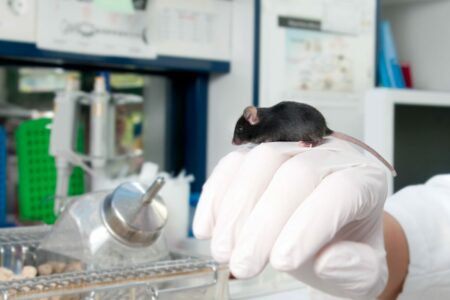The use of animals in educating the next generation of life science researchers
The COVID-19 pandemic has demonstrated both the value and limitations of simulation techniques for the next generation of researchers. The rapid development of tolerable and efficacious vaccines for COVID-19 has been built on decades of prior research which has involved animals1. Ensuring the safety of the COVID-19 vaccine in humans would not have been possible without first testing it on animals2.
As universities return to face-to-face teaching methods after a year of socially distanced and remote learning, The Physiological Society has developed this document to reinforce the unique benefits of in vivo education for students who are interested in pursuing a career using these research techniques.
Background
The Society and its members recognise that research using animals is necessary for the understanding of basic physiological mechanisms, for the development of treatments for veterinary and human diseases, for understanding the impact of environmental change on wildlife, and for validation of alternatives to replace the use of animals.
This research can only be conducted if a sufficient number of the next generation of researchers are exposed to and trained in the required in vivo skill-set as part of their bioscience education.
The use of animals is the most tightly regulated areas of education for the small minority of bioscience undergraduates and postgraduates that will go on to be the next generation of the UK’s researcher base and educators. Only those undergraduates and postgraduates that have a continued interest in biological training, simulation and demonstrations will require in vivo opportunities to demonstrate their temperamental, ethical and skills in this area. The practical application of in vivo skills can only be taught in an appropriate establishment under a Home Office educational licence.
Key benefits of in vivo skills education for undergraduates and postgraduates
- Undertaking in vivo research for educational provides novel and reinforcing physiological educational benefits that that cannot be provided through other methodologies
The Society recognises that there is a requirement for contemporary data to evidence the benefit of education in in vivo research, and to compare the efficacy of different methods of delivery in meeting the required educational outcomes. Some outcomes of in vivo research cannot currently be replaced or replicated with alternative methods, and some could be further refined. Without empirical evidence on the best methods of training future in vivo researchers, the field cannot progress, or fulfil its commitments to the 3Rs.
- Ensuring the next generation of researchers can develop the skills to ethically use animals in research and prevent a skill shortage of academics to continue education in, and research involving in vivo skills
In order to ensure that future researchers are understand the legal frameworks, and are able to use animals in research within those frameworks, they must be upskilled with first-hand experience of handling and caring for, and monitoring animals and their health, from breeding through experimental interventions and/or induction of models of disease processes, to minimising harms and humane killing of animals. Additionally, students will also develop subject-specific knowledge depending on their area of specialisation, as well as a deep understanding of physiology, anatomy and research ethics.
- Supporting the development of researchers to manage the experimental challenges of the use of animals in research
Unlike in simulations, not all research goes as planned or produces the expected results. Students need to experience this in a supported teaching environment to reflect on improved practices and the philosophical challenges that arise from these real-life procedures.
- Ensuring researchers are given time to fully prepare emotionally for using animals in their research
- Fostering the discussion around risk and reward of using animals ensuring the correct type of animals are only used in research when is it appropriate
Working with research animals first-hand gives students the opportunity to raise questions about the appropriateness of one model compared to another in study of any particular process or condition, taking into account the cost/benefit or harm/benefit analysis of animal models from both ethical and financial standpoints.

